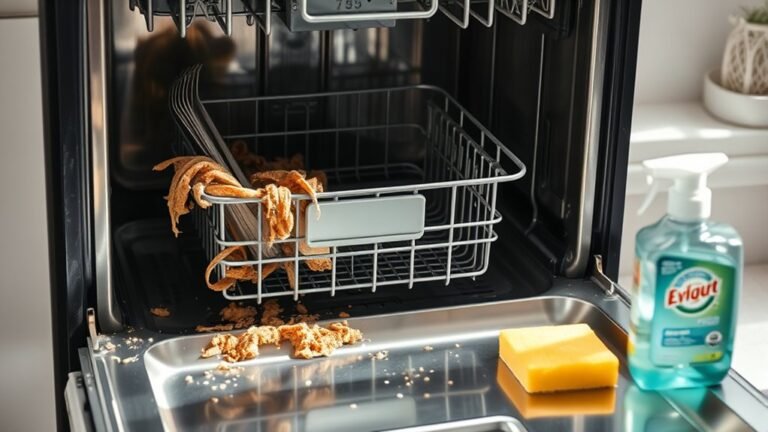Seasonal Maintenance Tips for Grease
You should adjust your grease maintenance with the seasons to keep your machinery running smoothly. In cold weather, use low-temperature grease for better flow, while summer demands high-heat grease to prevent thinning. Apply the right amount to avoid waste and protect parts, and always monitor grease condition for contamination or breakdown. Store grease properly in airtight containers to maintain consistency. Keeping these tips in mind helps prevent breakdowns and boosts performance, and there’s more to explore on optimizing your grease care throughout the year.
Understanding How Temperature Affects Grease Performance

Because grease performance changes with temperature, it’s important to understand how heat and cold affect its effectiveness. When you face temperature extremes, the grease viscosity shifts, altering how well it lubricates your equipment. In cold conditions, grease thickens, making it harder to flow and protect moving parts, which can lead to increased wear. Conversely, in high heat, grease can thin out, losing its ability to stay in place and shield surfaces from friction. Knowing this helps you maintain your freedom to operate smoothly, without unexpected breakdowns. By grasping how temperature impacts grease viscosity, you stay in control, ensuring your machinery runs reliably no matter the season’s challenges. This knowledge empowers you to adapt and keep moving forward, no matter what the weather throws your way.
Selecting the Right Grease for Different Seasons
While you can’t control the weather, you can choose the right grease to keep your machinery running smoothly through each season. Different grease types and seasonal formulations are designed to handle temperature shifts, ensuring excellent protection and performance. Selecting the proper grease means freedom from unexpected breakdowns, letting your equipment work as hard as you do. Here’s a quick guide to help you pick the right grease type for each season:
| Season | Recommended Grease Type | Key Feature |
|---|---|---|
| Winter | Low-temperature grease | Resistant to cold flow |
| Spring | Multi-purpose grease | Balanced protection |
| Summer | High-temperature grease | Heat stability |
| Fall | Water-resistant grease | Moisture protection |
Choosing seasonal formulations tailored to your environment keeps your machines running free, no matter the weather.
Proper Application Techniques for Seasonal Changes

You’ll need to adjust the grease consistency based on the season to guarantee proper lubrication. Applying grease at the right temperature helps maintain its effectiveness and protects your equipment. Preparing your tools for seasonal changes can prevent wear and extend their lifespan.
Adjust Grease Consistency
Although grease might seem like a simple product, adjusting its consistency for seasonal changes is essential to guarantee peak performance. When you’re adjusting viscosity, you’re tailoring the grease to flow just right—neither too thick to cause resistance nor too thin to lose protection. Seasonal formulations are designed to handle temperature swings, so choosing or modifying grease with the right consistency lets your equipment move freely and stay well-lubricated. Don’t settle for one-size-fits-all; embrace the freedom to switch greases or tweak their properties as the weather shifts. By fine-tuning grease consistency, you prevent wear and assure smooth operation throughout the year, giving you control and confidence in your maintenance routine.
Temperature-Specific Application
Whenever temperatures shift dramatically, applying grease correctly becomes crucial to maintain its effectiveness. When dealing with temperature extremes, you need to adjust your application technique to guarantee grease longevity. In colder weather, grease can thicken, making it harder to spread evenly. Warm it slightly before use, so it flows smoothly and reaches all necessary parts. During hot seasons, grease may thin out and run off surfaces, so apply it carefully to avoid excess loss. Use the right amount—not too much, not too little—to keep components protected without waste. By tailoring your approach to the specific temperature conditions, you’ll keep your equipment running freely and efficiently, no matter the season. This simple step maximizes grease performance and extends its life.
Seasonal Equipment Preparation
Adjusting your grease application based on temperature is just one part of getting your equipment ready for seasonal changes. To truly free your operation from unexpected downtime, tailor your maintenance schedules to the specific equipment types you manage. Different machines react uniquely to shifting weather, so you’ll want to adjust grease types and application frequency accordingly. For example, heavier greases suit winter’s cold better, while lighter ones work well in warmer months. Keep a close eye on seals and bearings, as they often need extra attention during seasonal changes. By syncing your maintenance routines with the seasons, you guarantee smoother performance and extend your equipment’s lifespan. Taking control of these details means less hassle and more freedom to focus on what really matters.
Monitoring Grease Condition Throughout the Year

Because grease performance can vary with temperature and usage, you’ll need to monitor its condition regularly throughout the year. Staying on top of grease monitoring helps you guarantee your equipment keeps running smoothly without unexpected breakdowns. By performing routine grease analysis, you’ll get clear insights into contamination levels, consistency, and any breakdowns caused by seasonal changes. This approach lets you make informed decisions about maintenance timing, avoiding unnecessary replacements and maximizing the grease’s lifespan. Grease analysis isn’t just a chore—it’s your freedom tool to keep operations efficient and worry-free. Don’t let hidden grease issues limit your equipment’s potential; consistent monitoring puts you in control, adapting your maintenance to whatever season or conditions come your way.
Identifying Signs That Indicate Re-Greasing Is Needed
Regularly checking your grease condition gives you valuable clues about when it’s time to re-grease your equipment. Watch out for grease discoloration—it often signals contamination or breakdown, meaning the grease no longer protects your parts effectively. Don’t ignore unusual noises like squeaking or grinding; these sounds can indicate insufficient lubrication causing increased friction. If your machinery feels hotter than usual or operates less smoothly, it’s another sign you should re-grease. Staying ahead of these indicators frees you from unexpected breakdowns and costly downtime. By promptly responding to signs like grease discoloration and unusual noises, you maintain your equipment’s freedom to perform at its best, no matter the season. Keep your maintenance proactive and your operations running smoothly.
Best Practices for Storing Grease During Seasonal Transitions
When seasons change, how you store your grease can make a big difference in its performance and lifespan. Properly sealed grease containers help prevent contamination and moisture buildup, extending storage duration. Keep containers in a cool, dry place away from direct sunlight to maintain grease quality. Avoid temperature extremes to prevent separation or hardening. Here’s a quick guide on best practices:
| Tip | Why It Matters | Action |
|---|---|---|
| Use airtight containers | Prevents contamination | Seal tightly after each use |
| Control storage temp | Maintains consistency | Store between 40-80°F |
| Avoid moisture exposure | Prevents degradation | Keep containers off the floor |
| Limit storage duration | Guarantees effectiveness | Rotate stock every 6 months |
| Clean containers | Prevents mixing types | Wipe rims before resealing |
Following these tips guarantees your grease stays ready for freedom-filled work.
Frequently Asked Questions
Can Seasonal Maintenance Tips Differ for Synthetic Versus Petroleum-Based Greases?
Yes, seasonal maintenance tips can differ for synthetic versus petroleum-based greases. You’ll find synthetic advantages like better performance in extreme temperatures and longer-lasting protection, which means less frequent maintenance. On the other hand, petroleum drawbacks include thicker consistency in cold weather and potential breakdown in heat, requiring more regular checks. Understanding these differences lets you tailor your maintenance approach, giving you the freedom to keep your equipment running smoothly year-round.
How Do Humidity Levels Impact Grease Performance in Different Seasons?
You’ll find that humidity effects can really change how grease performs across seasons. When humidity’s high, moisture can seep into the grease, thinning it and lowering grease viscosity, which means less effective lubrication. In drier conditions, grease tends to stay thicker and work better. To keep your equipment running smoothly, you’ll want to monitor humidity levels and adjust your grease type or maintenance schedule accordingly, giving you the freedom to avoid unexpected breakdowns.
Are There Eco-Friendly Greases Suitable for Seasonal Maintenance?
You’ll find plenty of eco-friendly greases that suit your seasonal maintenance needs, especially biodegradable options that break down naturally without harming the environment. Plant-based alternatives are becoming popular, offering great performance while letting you enjoy freedom from harsh chemicals. These greases adapt well to temperature shifts and humidity changes, keeping your equipment running smoothly and your conscience clear. Switching to these greener choices means you’re protecting both your gear and the planet.
What Tools Are Recommended for Cleaning Old Grease Before Re-Application?
Did you know that using the right cleaning tools can boost grease removal efficiency by up to 75%? When prepping surfaces, you’ll want powerful grease removers combined with sturdy brushes, scrapers, and rags to strip away old buildup. These tools free you from stubborn grime, making your re-application smoother and more effective. Choosing the right gear means less hassle and more freedom to keep your equipment running clean and smooth.
How Does Seasonal Maintenance of Grease Affect Machinery Warranty Terms?
You’ll want to stick closely to maintenance schedules because neglecting seasonal grease upkeep can lead to warranty implications. If you skip or delay grease maintenance, manufacturers might void your warranty since they expect regular care to prevent damage. Staying on top of grease guarantees your machinery runs smoothly and keeps your warranty intact, giving you the freedom to operate without worrying about unexpected repair costs or coverage issues.






